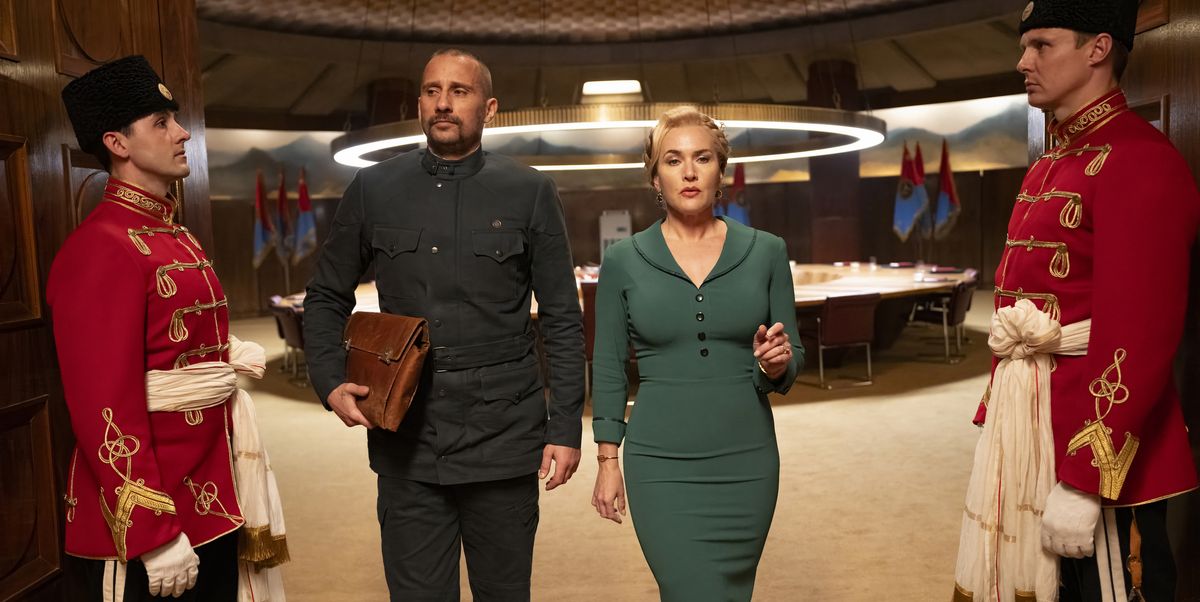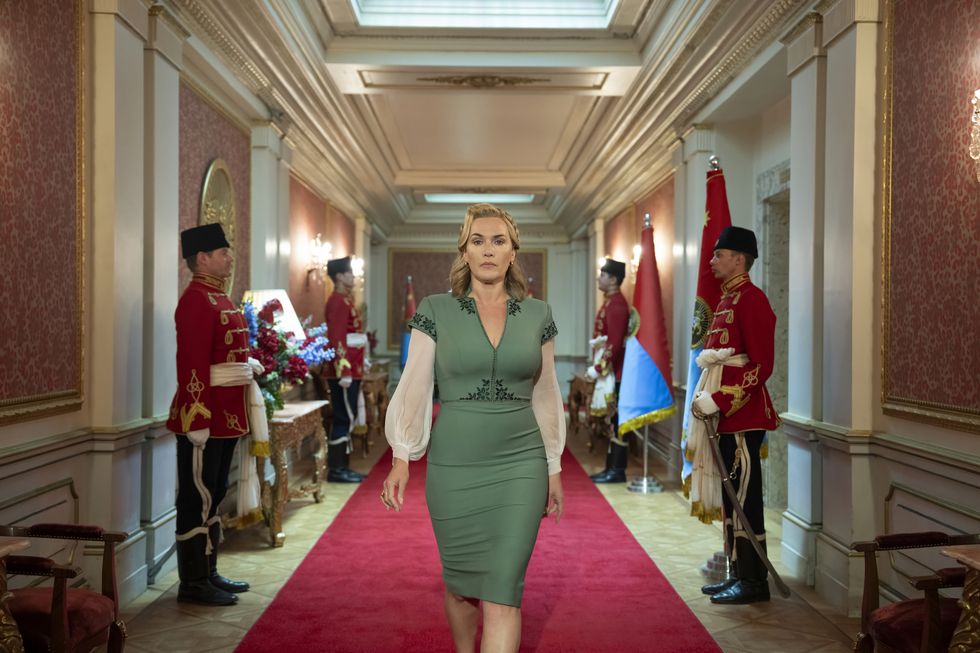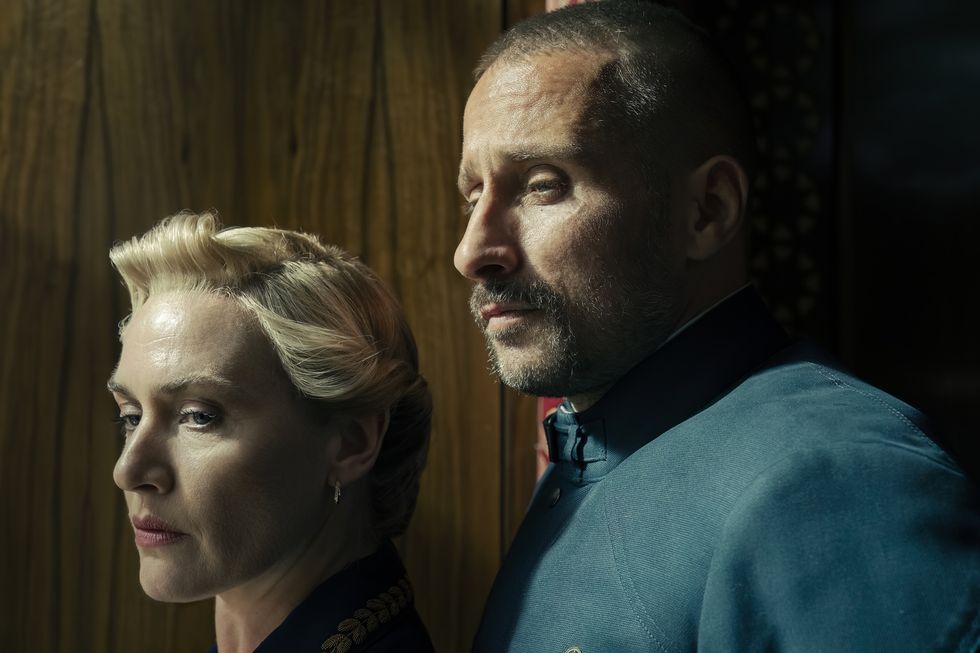Products You May Like
Spoilers below.
Of all the things world leaders have to worry about, The Regime’s Chancellor Elena Vernham (Kate Winslet) is most concerned with mold. She fears the fungus in the palace walls is killing her, so much so that her residence is either being renovated or covered in plastic. When a disgraced soldier joins her staff, his primary task is to walk by her at all times, tracking the moisture in the air. The chancellor’s absurdities don’t end there; she talks to her father’s rotting corpse in the basement, she sings “If You Leave Me Now” (terribly off-key) to her esteemed guests at a state dinner, and then there’s her strange drawl.
Such behaviors aren’t based on any specific real-life leaders, says Will Tracy, showrunner of the dark satirical drama. “If anything, her kind of fixation and hypochondria reminds me more of myself or people in my own family than it does of any specific leaders,” he confesses. “Although these kind of power-hungry, control-obsessed leaders, there’s a commonality amongst some of them with germophobia or a fear of death, a fear of disease.”
And also, a fear of losing power. Chancellor Vernham, played sharply by Winslet, is just as paranoid about the things that threaten her health as those that threaten her authority and approval rating. Her desperation makes her ripe for an odd relationship with her new right-hand man, the brawn and at times boorish Zuback (Matthias Schoenaerts)—the one who tracks the mold but becomes something more.
Tracy, whose credits include The Menu and Last Week Tonight, first came up with the idea for The Regime about five years ago, when he was in the writer’s room for Succession season 2. He’d been reading about autocrats and oppressive regimes, as he often does, and was particularly struck by The Emperor by Ryszard Kapuściński, and specifically Haile Selassie, the last Emperor of Ethiopia. “It kind of walks you through not only the end of his regime, but also just what his day was like: what he would eat for breakfast, how he would dress, who would dress him, when he would take his daily walk, when he would take his meetings,” Tracy says. “And I just thought, that’s a fun precinct for a show.”
As he fleshed out the premise, the romantic angle arose. “And then it [required] quite a bit of development in my head and research into, ‘Okay, where is this place and what’s the political conflict? And then also: how do we emotionally access this person?’ Through that, I kind of landed on this sort of love story, I guess, between a man and a woman, a leader and a follower, and it developed from there.”
Tracy delved extensively into authoritarian regimes. (“I’m embarrassed to say it’s almost sort of my comfort reading or my beach reading.”) But it wasn’t just in order to find the basis of the lead character. Rather, it was to help build out the show’s geopolitical landscape and the “strategies that could generate an interesting story and lead us to big stakes and big consequences.”
If you haven’t figured it out already, Chancellor Vernham is a fictional leader of a fictional country, but Winslet, who is also a producer on the show, worked closely with Tracy, as well as the show’s directors, Stephen Frears and Jessica Hobbs, to make her feel real.
In fact, while writing the chancellor character, Tracy was “fearful of relying too much on any research,” or making any obvious parallels to recognizable figures. “I didn’t want audiences to watch the show and think, ‘Oh, this is a version of so-and-so. Well, this is a Frankenstein version of…it’s this dictator plus that person…’ I kind of wanted people to feel, if anything, like, ‘oh, this is a type of head of state, like modern head of state that we haven’t exactly seen yet, but it feels plausible. We might one day.’”
Here, Tracy walks us through The Regime, Chancellor Vernham, and what he learned from working on Succession.
Did you always know you wanted Kate Winslet for this role? I mean, how could you not?
Whenever I read anything, I just try not to have anyone in my head as a self-preservational thing, in case they’re unavailable. I don’t want to get attached to someone and then learn that they’re booked solid for two years. So I try not to think of anybody in my head. All I had in my head was a kind of growing anxiety that, “oh, this might be tricky to cast because you need someone who the audience sees and immediately buys [into]: Yes, I believe that that person could, with an iron grip, command the undying loyalty and love of millions.” So what you need for that is not just a good actor. You need someone with a kind of world-historic charisma and magnetism that you would buy them. Like, yes, a cult of personality could form around this person if they chose to be a monstrous dictator. And Kate obviously has that charisma and magnetism, but she also has so much else, and the ability to handle the comedy, the kind of absurdity of the story, but also in those moments where she’s not in front of her adoring millions and those more private moments where she can let the mask drop and we see how broken and insecure this person is. She was brilliant at those vulnerable moments as well.
Was she the one who came up with the voice? Or was that a joint effort?
My main input—and I remember saying this early on to the directors and then to Kate—was that when a lot of these authoritarian figures throughout history first arrived on the scene, people felt like there was something off about them. They sounded funny or they looked funny, or “who’s this person? This person can’t be head of state. They’re ridiculous.” Laughable figures. But then these figures take those weird quirks or off-putting qualities, and in some strange way, they make them their superpowers. They weaponize that, and that’s what makes them interesting and unusual, and that catapults them to stardom, and that’s how they end up usually accruing and being catapulted to power is that they’re so strange….And so Kate worked very hard to develop: what are the things, what are the quirks? What are the little details and mannerisms and idiosyncrasies that will make this person someone where you could buy that they’re not just a polished politician? No. They have to have something that’s very strange about them.
I’d love to dig into the twisted love story a little bit between Elena and Zuback. What are they seeking in each other?
What they’re seeking, in some ways, is a traditional love story. What everyone seeks from a partner in some ways is someone who makes you feel like the best version of yourself. And I think, for little glimmers there, in a fucked up way, they kind of do that, right? I mean, he kind of makes her feel as though she is strong, that her fears of what’s killing her are unfounded, but actually there are some forces that seek to destroy her, but they’re not the forces she thinks they are. And she can fight back. She can be a real serious person with serious aims on the world stage and that gives her this whole exciting new story she can tell herself about herself.
Meanwhile, I think he is this very guilt-ridden, broken person, but she makes him feel as though he’s a real person who’s worthy of love, that he can do something to help himself and to help his country, and that he has direction in his life. He has purpose. There’s a reason for him to be alive, and that he can give his love as well. And so for a moment there, I’m making this sound quite like The Notebook or something—
For them.
For them, it does feel that way. I always think of Sleeping Beauty like, “I know you, I walked with you once upon a dream.” They kind of feel as though they’ve already inhabited each other’s dreams in some mysterious way, and maybe they have. And so ultimately, it’s the love story that can’t work, as much as they try to convince themselves to the bitter end. It can’t, because ultimately, he’s a product of the state and the abuse of the state that she created, the world that she made. And he’s among the millions of loyalists who have given her all of this love and all of this love has in some way poisoned her brain, the fame, the power of the adulation. She’s broken. They’re kind of broken in ways that are incompatible, so they could just never be an equitable partnership, which is what you have to have.
You’ve worked on Succession and The Menu and John Oliver—is there something that draws you to the theme of satirizing and skewering the powerful and the privileged?
Maybe. If I’m being honest, I think that that type of power and the access to power and control and who has it and who doesn’t, that’s just a quite easy way to generate conflict and big stakes in a story. And so it’s not even so much that I’m attracted to what I’m going to say about satirizing it, it’s just kind of an engine for exciting storytelling or storytelling that feels big and propulsive.
So I think that’s why I gravitate to those worlds. If I want to say something big about art and the people who make it and the people who consume it, which is what I think The Menu’s about, then it can’t be a sandwich shop. It has to be a high-ticket, modernist, show-stopping, artistic tasting menu restaurant. Who dines at that restaurant? And then you can kind of give that power relationship between the consumer and the creator. And similarly, if you want to say something about geopolitics and the way it works and foreign policy, then you want to be right there in the lion’s den, with the people who are making the decisions.
Any big lessons from working with Jesse Armstrong as you transitioned as a showrunner of your own series?
So many lessons. He really taught me how to write series television, and this is a little bit different because it’s a limited series. Some of Jesse’s biggest lessons were about, as he says, “keeping your powder dry,” which means we could have the big fight right now between Shiv and Tom where they really get into it, or we can lower the temperature on this scene and this fight, and it could be a little bit more clipped, and they could do what most married people do, where it gets a little bit edgy, but then they pull their punches a bit because they don’t want to get into it all. And the more you pull your punch and don’t get into it all, the resentments grow and they accumulate, and then two seasons from now, we can have the big fucking fight on the balcony in front of everybody, and it will have felt so devastating, but somehow inevitable and earned at that moment.
And so he was very good at knowing when to turn the temperature down, keeping things subtle, keeping things unsaid, because that’s kind of the way life works. I mean, people often don’t want to get into the big discussion of their feelings and what they’re really thinking. People will go to extraordinary lengths to avoid saying what they’re really thinking, and in fact will pretend to think the exact opposite, because they think that’s what people want to hear, or that will make the situation easier to navigate or less emotionally painful. He was really good at that. And that can be hard, to avoid the temptation as a writer of “what if they just blah in the big argument. Everyone says exactly what they’re thinking.” But it’s not often how life works.
This interview has been edited and condensed for clarity.


